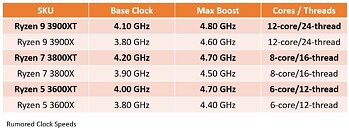Sunday, May 24th 2020

Possible 3rd Gen AMD Ryzen "Matisse Refresh" XT SKU Clock Speeds Surface
Last week, we brought you reports of AMD inching closer to launch its 3rd generation Ryzen "Matisse Refresh" processor lineup to ward off the 10th gen Intel Core "Comet Lake" threat, by giving the "Zen 2" chips possible clock speed-bumps to shore up performance. The lineup included the Ryzen 9 3900XT, the Ryzen 7 3800XT, and the Ryzen 5 3600XT. We now have a first-look at their alleged clock speeds courtesy of an anonymous tipster on ChipHell forums, seconded by HXL @9550pro.
The XT SKUs indeed revolve around 200-300 MHz increments in base- and boost clock speeds as many of our readers predicted in the "Matisse Refresh" article's comments section. The 3900XT comes with 4.10 GHz base clock, and 4.80 GHz max boost clocks, compared to 3.80 GHz base and 4.60 GHz boost clocks of the 3900X. Likewise, the 3800XT notches up to 4.20 GHz base clock (highest in the lineup), and 4.70 GHz max boost, compared to 3.90-4.50 GHz of the 3800X. The 3600XT offers the same 4.70 GHz max boost, a step up from the 4.40 GHz of the 3600X, but has its base clock set at 4.00 GHz, compared to 3.80 GHz on the 3600X. It appears like AMD's design focus is to reduce, if not beat, Intel's gaming performance lead. The 10th generation Core "Comet Lake" tops gaming performance by a mid-high single-digit percentages over AMD's offerings, and AMD could bring them down to low single-digit percentages with the XT family.
Sources:
ChipHell forums, HXL aka 9550pro (Twitter)
The XT SKUs indeed revolve around 200-300 MHz increments in base- and boost clock speeds as many of our readers predicted in the "Matisse Refresh" article's comments section. The 3900XT comes with 4.10 GHz base clock, and 4.80 GHz max boost clocks, compared to 3.80 GHz base and 4.60 GHz boost clocks of the 3900X. Likewise, the 3800XT notches up to 4.20 GHz base clock (highest in the lineup), and 4.70 GHz max boost, compared to 3.90-4.50 GHz of the 3800X. The 3600XT offers the same 4.70 GHz max boost, a step up from the 4.40 GHz of the 3600X, but has its base clock set at 4.00 GHz, compared to 3.80 GHz on the 3600X. It appears like AMD's design focus is to reduce, if not beat, Intel's gaming performance lead. The 10th generation Core "Comet Lake" tops gaming performance by a mid-high single-digit percentages over AMD's offerings, and AMD could bring them down to low single-digit percentages with the XT family.

113 Comments on Possible 3rd Gen AMD Ryzen "Matisse Refresh" XT SKU Clock Speeds Surface
3900XT looks really nice though.
that 3800XT would be a monster, if the wattage doesnt go up too high
Also, ryzens clocks aren't the biggest issue, you can learn it from ln2 benchmarks at 5000+ all core, it's still behind Intel in games bc of IF limitations.
Also min framerate aren't dependent on max boost clocks bc it shows what's happening when game puts tonna load on 1 or multiple cores. At this moments cpu clock is far lower max boost values
Another caveat, these thing would likely consume more than 125W , and dangerly close to, if not surpassed Intel in term of heat generated.
But hey, you got blingy Wraith Prism Cooler, so that still a plus :D
Ryzen "boosting" lasts less (fractional ms if that), Ryzen CPUs will refuse to boost when REALLY needed (a modern Win7/8/10/Linux system running its usual arsenal of 100+ services and 100+ processes will cause your average Ryzen CPU to say "No, yeah, thanks, not gonna boost now!" Even when all the thermals are right AND the binnin' lottery was won AND all the "voodoo" is right AND all the stars are lined up, your average Ryzen will maybe get close to that advertised MHz for a fraction of a second and then... bail. Vs your average Coffee Lake out of the box where the CPU will hang for HOURS at boost speeds if the thermals are right.
Besides one major factor here to consider... legacy x87 32bit code is where lot of your gaming still occurs and this is where AMD is still stuck in mid 2000s, at about 50% to even 100% in some legacy gaming scenarios.
Yeah, this is will NOT narrow the difference a whole, much less have AMD overtake in gaming (all in all). They need a solid GHz+ or even a bit more to secure that overwhelming gaming superiority. That is not happening with AM4, probably not even AM5.
...
..
.
Now factor in the cost of cooling that overclocked 10600KF (enjoy the 253w of power consumption) and a Z class motherboard to even able overclocking. You are looking at around $200 more.
That's $438 total.
On the other hand, you can run the 3600 XT on something like the Asrock B450 HDV, which retails for $69 (excellent board for the money) and the cooler is included for free. The best part? It just works. No need to fiddle with overclocking and stability testing.
That's $269 total.
If you are going for the absolute highest FPS, you should be buying a 10900K. Otherwise it makes zero sense to spend a ton more on the 10600KF over something like the 3600 / 3600 XT to get a margin or error performance boost, assuming you OC and your chip isn't a dude. The 10600KF isn't a good value if you are going to overclock it and buy a Z class motherboard and CPU cooler. Far too little gain for too much money. Heck AMD doesn't even need the 3600XT, the 3600 is a great high FPS gamer right now at a lower price with a cooler included.
All that taking into consideration that AMD's next gen chips aren't too far off. I doubt the 10600KF's limited value will maintain through that launch.Intel boost spec is 5 seconds at the specified max boost. Only with MCE (which is overclocking) enabled on Z class motherboards is this spec exceeded.
TechSpot has observed this behavior: www.techspot.com/review/2028-intel-core-i9-10900k/
Same as many other tech outlets. MCE is not new nor is Intel's 5 second boost clock.
Your description of Ryzen's boost algorithm, just like your description of Intel's boost algorithm, is not based on anything remotely factual.
This is more about making the general population not think that AMD is old and Intel has something new.
This is just about new reviews, putting AMD once again in the picture and PCs being able to be sold with "now with the AMD blabla, over 200mhz faster!!!!"
Im not saying its a bad move btw, its just that that is the only reason these chips were made and its kind of sad that that is just the reality of it all.
I love the mental gymnastics, keep em coming.
They had issues achieving advertised boost clock with purely synthetic low intensity single thread for even a split second, and that was the only thing the 1.0.0.3 ABBA AGESA microcode advertised to fix in september 2019.
It was kind of fixed for that BIOS revisions, but this forced jump to advertised boost clock speed for a split second is far from any maintained speed, and subsequent BIOS releases on many motherboards reintroduced the "problems".
But since this never reflected in rise or fall of any benchmark people stopped caring. And I strongly suspect Der8auer (the overclocker that exposed the behaviour) got pressured in not pursuing it further.
Source, overclocking/comments/gpt12y
So I'm not sure where your info is coming from.